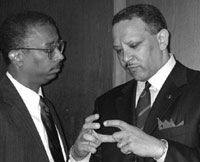
WASHINGTON (FinalCall.com) – The State of Black America is “strong” thanks to improvements in the status of Black families, but significant challenges remain, according to the 2003 edition of the National Urban League’s annual report.
There has been a slow, but steady increase in the number of Black families headed by married couples, up from 46.1 percent in 1996, to 47.9 percent in 2001, and more than two-thirds of all Black families have “stable working class to middle class” incomes.
The good news contained in this year’s “State of Black America” report, “is that Black families are resilient, strong, and have been the key to our progress and success,” Marc Morial, the newly elected president of the National Urban League (NUL) told The Final Call July 22.
“On the bad news side, the increase in the unemployment rate–because it has been so dramatic in a short period of time, if it’s not abated–portends many more difficult problems in our communities,” Mr. Morial continued.
“According to our report, marriage among African Americans is up, and more families are earning higher incomes,” Mr. Morial told reporters. But unemployment among Blacks has reached 12 percent, twice the national average.
The unemployment trend affects both males and females, according to the report. NUL findings show that 10.9 percent of single Black mothers are unemployed, compared to just 4.9 percent of White single mothers.
There is also a disproportionate incarceration rate for Blacks, particularly for non-violent offenders. Among Whites, that rate is 649 per 100,000 persons. Among Blacks it is a staggering 4,819 per 100,000.
The war on drugs has had a harmful impact on the criminal justice system, and mass incarceration has had a detrimental impact on public health in the Black community, according to the report.
“There is a clear need for our community to take more responsibility for the cycle of self-destruction–the glorification of violence, the easy access and utilization of guns, the recreational use of crack-cocaine. We have to take some responsibility,” Mr. Morial said in an interview. “But also, we think that some public policy changes to some of these laws, as well as comprehensive prison reform could help with the problem too.”
Some of those public policy changes could have a beneficial impact on the disproportionate rate of Black males in prison, compared to the number of Black females in colleges and universities. Currently, 166 Black females attend college, for every 100 Black males seeking higher education.
Public policies now in place preclude Black males who earn GEDs, and high school diplomas while in jail or after incarceration from going to college, according to Dr. James Lanier, Senior Resident Scholar for Community Justice Programs at the National Urban League’s Institute for Opportunity and Equality.
Once people in this country get a felony drug conviction, “they can no longer participate in the education process, in terms of getting an educational loan, they can’t get a P.E.L. Grant. Those kinds of things are denied,” Dr. Lanier told reporters.
“We need to change some policies that will make it possible for African American males to participate in the higher education process.”
Even in the face of those obstacles, he reported, “Black male college enrollment has been going up, and the share of baccalaureates awarded to Black males has been going up,” and that increase has been at a higher rate than the increase by White males in college.
There is good news and bad news concerning the influence of the Black middle class as well, according to Dr. James Teele, professor of Sociology at Boston University. Dr. Teele studied the intellectual legacy of the late Dr. E. Franklin Frazier, author of the groundbreaking study Black Bourgeoisie, published in this country in 1953.
While Dr. Frazier initially hoped that Blacks would assimilate into the American mainstream just as European immigrants had done, later, however, he changed that view. Dr. Frazier “appeared to worry that assimilation would weaken the Black community, because he felt that Blacks could not, as whites could, depend on the structures of government to aid their survival–the decades since reconstruction had proven that,” Dr. Teele wrote.
“(Dr.) Frazier didn’t believe the Negro leadership was capably exercising its responsibility to improve the lot of the Black masses.”
“He was worried,” Dr. Teele told The Final Call in an interview, that Blacks would not take Whites “as the model. But Frazier thinks we’ve got to be different, that we’ve got to emphasize community, and sticking together, and providing models for our kids, and having stronger families. He’s always been for that. If he were alive today, he’d be singing the same song.”












